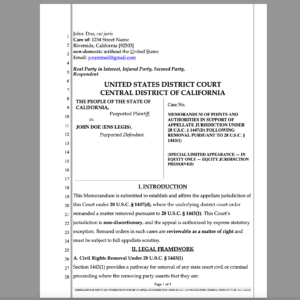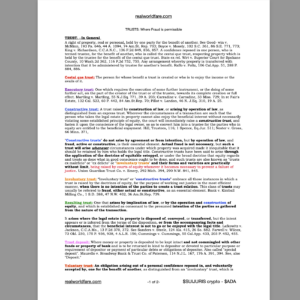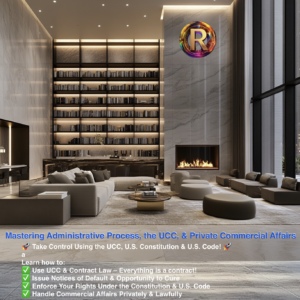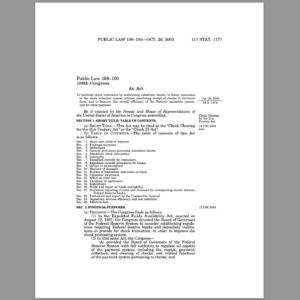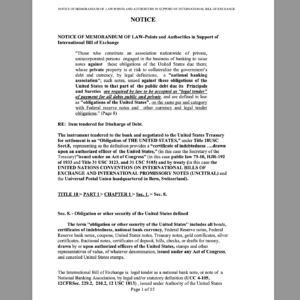A “U.S. citizen” is a type of ens legis, which is a legal entity or artificial person created by the State. This “ens legis” operates exclusively in the public realm, where all interactions and activities are governed by statutory rules, regulations, and commercial laws. It is essentially the player piece needed to navigate the public side of society, as everything in the public is commercial in nature. The “U.S. citizen” is not a living, breathing individual but rather a fictional entity similar to a company, trust, corporation, or other artificial construct recognized by the State.
The living man or woman—the natural, breathing human being—controls and directs the “U.S. citizen” (ens legis) when they choose to interact with the public side. For example, when a person engages in commerce, opens a bank account, files taxes, or signs legal contracts, they are acting through the “U.S. citizen” (the ens legis) to comply with the commercial and statutory requirements set by the government.
However, the living man or woman has a choice: they can operate in the private side where they do not use the “U.S. citizen” but instead act as a sovereign being, free from the obligations and restrictions that come with engaging as an ens legis. In this private capacity, they maintain their natural rights and are not automatically bound by public statutes unless they voluntarily consent.
Therefore, the “U.S. citizen” is simply the interface or vehicle controlled by the living man or woman to function in the public, commercial world. Understanding this relationship allows the individual to choose when and how they wish to engage in the public side, maintaining their autonomy when they operate privately.
Imagine you’re playing a big board game. In this game, you need a special piece to move around the board and play. That piece is usually called an “ens legis,” or “individual,” or “person,” or “trust,” or “company.” But here’s the trick: it’s not a real piece; it’s a pretend one, like a character in a video game, and the character can only interact with other face characters on the public side of the game. It’s also called a “U.S. citizen.” This “U.S. citizen” isn’t a real person—it’s a fake, dead thing, like a puppet or a trust, corporation, or individual that only exists in the game’s rules.
Now, every time you do something in the game—like buy an automobile, buy a home, open a checking account or bank account, get a credit card or loan, go to school, or get a job—you’re using this fake piece called a “U.S. citizen.” The people who run the game (like the government and their companies) expect you to know how to use it because everything is commercial—meaning it’s all about trading, buying, and selling. In fact, according to 27 CFR § 72.11, just about all crimes are considered commercial in nature. This means that even actions that seem like crimes are commercial transactions. “Ignorance of the law is no excuse.”
However, this game has two sides: the public side and the private side. On the public side, everyone can see you and interact with you using your “U.S. citizen” piece. But the private side is where real people (like you) exist, away from the game. In this private realm, the rules are different, and you can make choices that are not dictated by the commercial game.
But if you don’t know you’re using this piece, they treat you like you don’t know how to play. In legal words, they call you “incompetent.” When they say you’re “incompetent,” they give you a guardian called a lawyer. However, it’s important to note that “Lawyers” have a duty not just to their clients but also to the court. In fact, according to 4 ATTORNEY & CLIENT 7 C.J.S. and 2-3 ATTORNEY & CLIENT 7 C.J.S., a client represented by an “Attorney at Law” is considered a “ward of the court.” This means the “attorney” is obligated to place the interests of the court first, above even the interests of the client. The client is thus in a diminished position of authority over their own case once representation is retained.
If you don’t know you have this piece, you might accidentally pledge yourself as something like “collateral.” That’s like promising to pay off things you didn’t know you agreed to. And here’s another secret of the game: if there’s no real harm (like no one got hurt or nothing got damaged), you can often settle the situation with just a signature or by giving permission. It’s like using a magic wand to fix things as long as you know what you’re doing and there is no verified injured party.
So, it’s important to know that there’s a difference between being a “U.S. citizen” (the game piece) and a real man or woman. The “U.S. citizen” is just the player piece for the board game called commerce. If you don’t know how to play, you might get tricked into thinking the game piece is the real you, which can lead to problems. By understanding the public and private sides of this game, you can make better choices and avoid getting caught in the traps set by those who control the rules.





